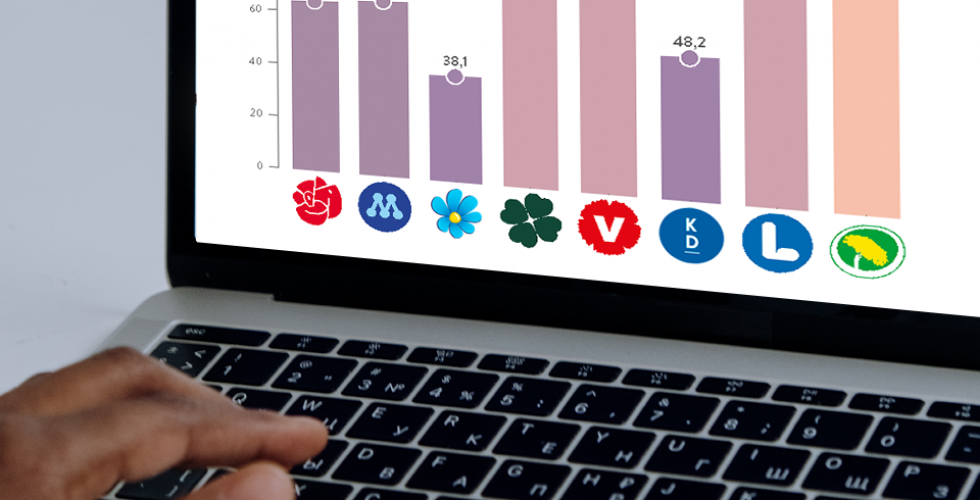
RFSL releases election report: the Left and Green party in the top, Swedish Democrats at the bottom
The Left Party get the highest grade for how they have acted in parliament for LGBTQI individuals' rights over the past four years, while the Green Party get the highest grade for the LGBTQI policy they want to carry out in the future. That is apparent from the election report RFSL has released. The Swedish Democrats get the worst grade.
It’s soon time for the Swedish parliamentary elections. RFSL has presented a comprehensive election report consisting of two parts: a review of how the parties have acted in 23 votes on LGBTQI issues in parliament during the most recent term of office, and a survey about what reforms the parliamentary candidates want to make to improve the conditions for LGBTQI individuals in the future. The survey touches upon 15 central issues where reforms are necessary and has been answered by 279 parliamentary candidates.
Best and Worst
Those with the best results in the survey are the parliamentary candidates from the Green Party (92,7), the Left Party (83,2), the Centre Party (82,9) and the Liberals (82,8) on a scale of 0 to 100.
The Social Democrats’ result is 63,5 based on the parliamentary candidates’ answers to the survey, which is the third worst grade. The Christian Democrats place themselves next to last, and the Swedish Democrats are in last place in the survey. The Moderate Party places itself just above the Social Democrats.
The study of 23 votes in parliament during the past four years on issues significant to LGBTQI individuals shows that the Left Party is the party that most consistently has voted for improvements in the lives of LGBTQI individuals in parliament. The Swedish Democrats are the party that most consistently has opposed improvements for LGBTQI individuals.
– It’s positive that many parties have improved their results significantly compared with when RFSL posed similar questions before the last election, among them the Centre Party and the Christian Democrats. However, we are concerned that the Swedish Democrats as parliamentary partners to a future government would mean that no improvements could be made for LGBTQI individuals in Sweden, says RFSL’s chair Trifa Shakely.
The Social Democrats Lack a Common Vision
The answers to the survey show that the Social Democrats don’t seem to have a common vision for what reforms are necessary to achieve an improvement in the lives of LGBTQI individuals. For example, the S candidates have a mostly negative attitude towards the possibility of more than two adults taking parental responsibility, becoming legal parents and guardians. Only 32 per cent of the S candidates answer yes to this question, while others answer no or that they haven’t made up their mind. The S candidates are also split in the question about instating a third legal gender, to give more people access to a legal gender that reflects their gender identity: 51 per cent answered yes to that question, others no or that they haven’t made up their mind.
The Swedish Democrats are rated the lowest
The weakest interest in improvements is found in the Swedish Democrats, who rate lowest out of all parties. Only in five of the 23 votes in the latest term of office have the Swedish Democrats taken a stand aimed at improving, or in some cases not worsening, the lives of LGBTQI individuals. Out of the few Swedish Democrats’ parliamentary candidates who have answered RFSL’s survey, none answered that they wanted to make it possible to easily change legal gender without the requirement of a medical assessment.
Majority For a Ban on Conversion Attempts
The report shows that there’s still a lot of work to be done in politics to improve the lives of LGBTQI individuals. But the political parties’ interest in promoting change varies. However, in at least three of the survey questions there is a parliamentary majority:
- To instate a ban on conversion attempts.
- To change the Gender Recognition Act so that people have the opportunity to change legal gender without requiring a medical assessment.
- To decide about clearer legislation that regulates how parenthood and citizenship should be determined for children born after surrogate pregnancy abroad.
– The election report gives us hope that a ban on conversion attempts can become a reality. There’s also a parliamentary majority that wants it to become a simple administrative process to change one’s legal gender, where self-identification is the basis. It’s surprising and disheartening that the government last week still decided to propose that a medical assessment of gender identity still should be required to change legal gender, says Trifa Shakely.
